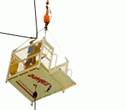Spelling it "Bungy" vs. "Bungee"
After talking to Ding Boston from BERSA I have now heard two versions of this story. I believe the first but it would be nicer to believe the second
A misunderstanding
As we already know (modern day) bungee was started in England by Oxford Dangerous Sports club, they called it Bungee. It was comercialised most successfully in New Zealand and they called it Bungy I guess as a spelling mistake. Since they made it more popular they say this is the True spelling.
I myself believe that Bungee is how it should be spelled, I used to spell it bungy simply because it was easier to type.
And now for a slightly more interesting explanation...
hairballrm@aol.com (HairballRM) said this on news:alt.sport.bungee
Bungee refers to the use of Shock Cords. Multiple, preloaded core rubber, cased cords. Most typical in North America is the 5/8 inch military specification shock cord. 210% elongation (2.1 times static length. Also recently available here TR2 240% and RipCord 280%.
Bungy originated in New Zealand, is all rubber cords (with no elongation limitation) and a variable offset anchor system allowing end stretch distance tuning and the controllable head dip.
Difference?
- Bungee
- more freefall, higher G, Rock and Roll ride. Big hangtime on rebounds. Not for the timid and undurable.
- Bungy
- Lower velocity, smoother ride, higher rebounds. Very conducive to ankle jumps
This can be explained by the two very different cords used in the US and Europe/New Zealand. In the US they use 3-4 cords shrouded in Static sheath which offers a little more safety than the Euro/Kiwi cords which are many elastic strips help together by more elastic strips. The US cords ride exactly like Bungee is described (and that how the makers spell it) and the Euro/Kiwi cords ride just like Bungy is described
More trivia
Howard Summers sent me this interesting bit of information, I guess they didn't look it up in France when they chose the name Benji
One comment, Benji is the Japanese word for toilet and by extension, sewer. Bungee, as I recall, is from a Hindi word. When I first went to Japan they had open sewers covered only with cement slabs in Tokyo. The odor was noticeable on a warm day and if someone removed a slab and you didn't look, you could step into it when you stepped off the curb.
The disappearance of the Benji was the first sign that Japan's economy was producing. And that was long before Japan began exporting cars.
Sue Ishii recently sent me this.
I read the More Trivia. Benji is not a right word . Benjyo is. We do not use this world now. Instead we use ote-arai, or to- i- re.
I hope that's cleared that up!



